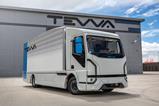A recent report from the Green Finance Institute calls for immediate measures to electrify HGVs in the UK.

The report by Green Finance Institute (GFI) 10 initiatives to accelerate the transition to carbon zero trucks. The not for profit organisation works with a variety of stakeholders in developing solutions to redeploy capital at the pace and scale that science demands. The organisation has identified transport as a sector for its focus and in its ”“Delivering Net Zero: Unlocking Public and Private Capital for Zero Emission Trucks,” offers a number of observations, insights and potential solutions to accelerate the uptake of zero emission trucks, the three main initiatives are:
- Utilisation Linked Financing (ULF): ULF is a financial solution that can de-risk investment in charging infrastructure either through a loan or asset finance. ULF can be structured so that payments are linked to the usage of the chargepoint, with payments only commencing once the asset is revenue generating.
- Shared charging infrastructure agreements: These agreements could allow HGV fleet operators to pool resources so they can buy or invest in electric charging infrastructure at depots together, reducing the capital investment required by each party and sharing the infrastructure maintenance. This could be done through joint ventures or a Special Purpose Vehicle, which provides financial protection for riskier projects by ensuring its operations are kept separate from the main company, or through a contractual agreement that protects all parties.
- Residual Value (RV) Guarantee: RV is the estimated value of a truck at the end of its lease term. An RV Guarantee could improve the RVs of electric trucks as set by financiers, which would reduce finance costs for operators and enable more of them to make a business case for adopting ZETs. Provided by government or a third party, it could be a more effective way to encourage adoption than the existing grant schemes for ZETs.
While acknowledging the potential of freight decarbonisation as a significant investment opportunity, the report highlights the current lack of demand for ZETs and the associated risks for investors. It notes that only 0.1% of HGVs in the UK are currently ZETs, primarily adopted by large companies or local authorities. The report features case studies of organisations adopting electric HGVs, such as Westminster City Council, Tesco, Amazon, and Welch’s Transport. Notably, it underscores the challenges faced by small businesses in accessing additional finance required for the transition.

“Heavy Goods Vehicles make up a significant proportion of the UK’s total carbon emissions, despite accounting for only 1% of vehicles on UK roads,” said Lauren Pamma, Programme Director at the Green Finance Institute. ”There is a £100 billion investment opportunity that we can unlock through innovative finance products, providing a massive opportunity to decarbonise the HGV sector before the government’s target of phasing out diesel trucks by 2040.
“Our report sets out some of the financing mechanisms that will help us roll out electric charging points and get more electric lorries on our roads to decarbonise the HGV sector. These include utilisation linked finance and shared charging infrastructure agreements that will particularly help SMEs, which own half the UK’s HGV fleet but struggle to secure green financing and need additional support.”
Supporting documents
Click link to download and view these filesDelivering Net Zero
PDF, FileSizeText 6.79 mb


















